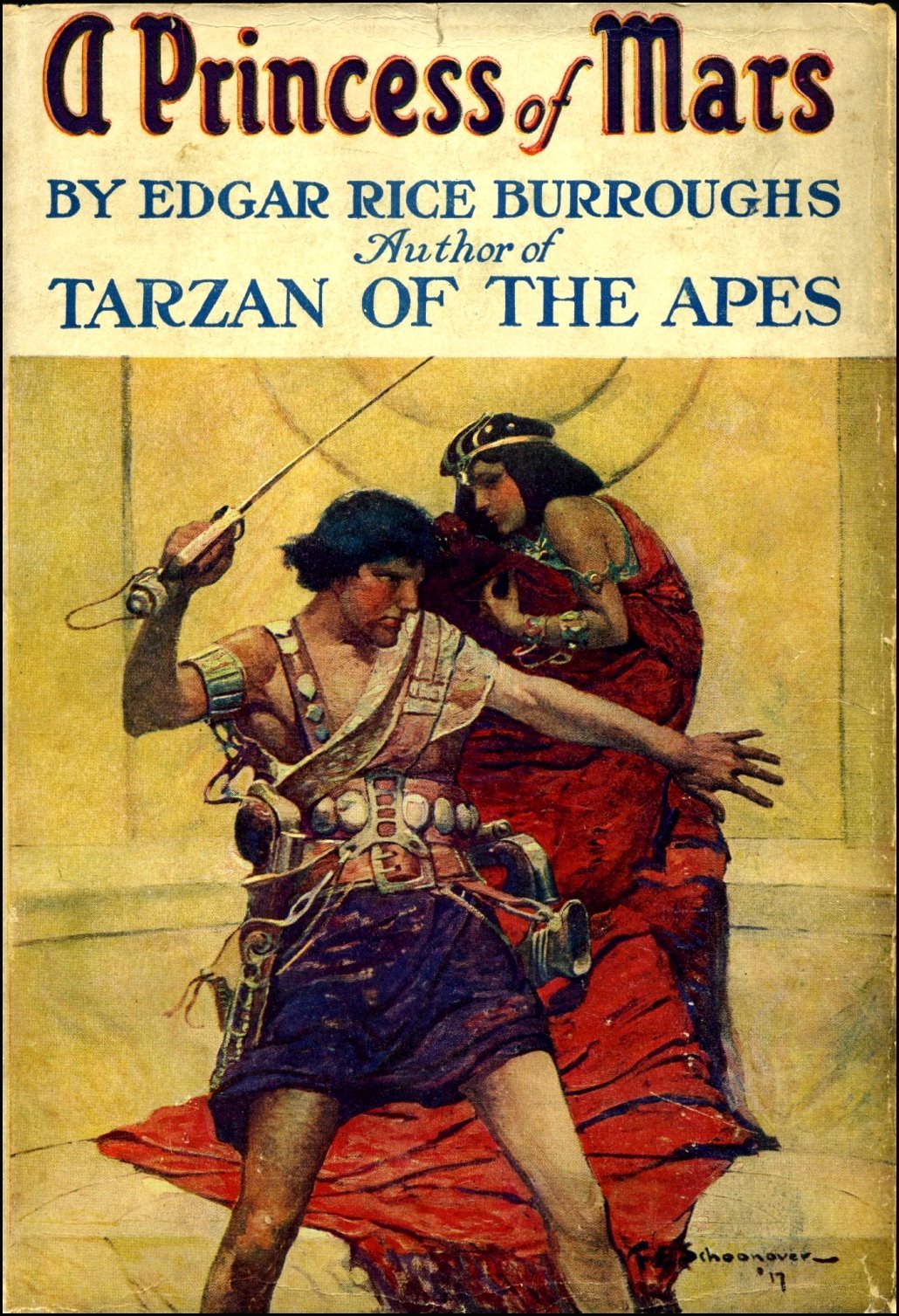Burroughs' books were written about a hundred years ago, and have their creaky and outdated elements, to be sure. These are not entirely due to the time that they were written. Burroughs' Tarzan is open to criticism on racist, classist, speciesist, and sexist grounds in ways that Kipling's Mowgli, in The Jungle Book, isn't: Tarzan is an English lord who is as superior to the blacks around him as he is to the apes; Tarzan discovers that the women of the city Opar, in an odd sexual dimorphism, are physically, mentally, and morally superior to the men of Opar. That little Y chromosome seems to carry so much inferior baggage! In contrast, Mowgli is a little Indian village boy, selected almost at random for survival when his family is attacked by a tiger, and taught true wisdom by the beasts around him.
Nevertheless, Burroughs had opulent settings, exciting plots, and a true literary streak in his words. Here is the beginning (Chapter 1, not the Prologue) of A Princess of Mars, the first of the Mars series.
I am a very old man; how old I do not know. Possibly I am a hundred, possibly more; but I cannot tell because I have never aged as other men, nor do I remember any childhood. So far as I can recollect I have always been a man, a man of about thirty. I appear today as I did forty years and more ago, and yet I feel that I cannot go on living forever; that some day I shall die the real death from which there is no resurrection. I do not know why I should fear death, I who have died twice and am still alive; but yet I have the same horror of it as you who have never died, and it is because of this terror of death, I believe, that I am so convinced of my mortality.Doesn't this set atmosphere and tone? Does it define a mystery? Does it make us want to read more? It should be clear that I expect that your answers to these questions should be "Yes." I'd be proud if I'd written that. I wouldn't be surprised if a Borges story started that way, although it would continue in a different direction.
And because of this conviction I have determined to write down the story of the interesting periods of my life and of my death. I cannot explain the phenomena; I can only set down here in the words of an ordinary soldier of fortune a chronicle of the strange events that befell me during the ten years that my dead body lay undiscovered in an Arizona cave.
This is to explain why I was excited by the upcoming release of the film John Carter of Mars and the anxieties I felt about it. Would it reproduce the opulent setting? Would each of the Martian races be true to itself? Would it do duty to the time and place it was set? Would it do duty to the story? Would Dejah Thoris be believably "incomparable," as John Carter often describes her? Would his eventual devotion to his adopted planet be believable?
It should be noted that these are different questions to those of many of the people who filed into a theatre to be entertained or to write a review. They wouldn't know who Dejah Thoris was, for example.
I knew that other films had dipped their fingers into the world of Barsoom. It seems obvious to me that George Lucas in this scene of Return of the Jedi had ERB as a ghost-writer. It has a desert overflown by open-decked "ships," harness as clothing, a mixture of swords and energy guns, exotic beasts, multiple intelligent species....all of which shout "Barsoom" to me. In addition, a low-budget, direct-to-dvd Princess of Mars came out in 2009. Still, these were meagre results considering that efforts to film Barsoom go back to the 1930s.
It should be clear that I was not a typical audience member for John Carter of Mars. My first and main criterion was that the film actually let me spend a little time in Barsoom as I remembered it.
The original book cover, from 1917.
The movie largely met my demands, simple as they were. Lynn Collins made a creditable job of being "incomparable."

Taylor Kitsch as John Carter looks like a Red Martian Warrior, but he needs to sound like a southerner. He's a Virginian who had fought fiercely on the losing side of the Civil War and is brought gradually to pledging his sword in another war. It is a major element in his character.

So, obviously, I enjoyed the film. However, many stayed away, and Disney has lost a lot of money on it. Some blame the title, since most potential viewers had no clue who John Carter is or what Barsoom means; some blame the odd marketing of an action-adventure story in, for example, the trailer above. Still and all, the film does not stink.
It is certainly not above criticism, though. I was impressed by the critical essay that the Hulk wrote about it. The main point is that we do not care about the characters because the film presents the key information about them just at the moment it is needed. If we had it earlier then we could follow the development of the character from his initial state and appreciate the choices he makes on the way.

Gareth, I enjoyed your excitement. It brought back the pleasure I had when reading these as a teen. And makes me wonder at re-looking at them. I haven't seen the movie, and was going to wait for it to to come to TV, but now... We'll see.
ReplyDeleteI've almost finished reading A Princess of Mars, what changes is free on gutenberg.Org. It's still fun.
ReplyDelete